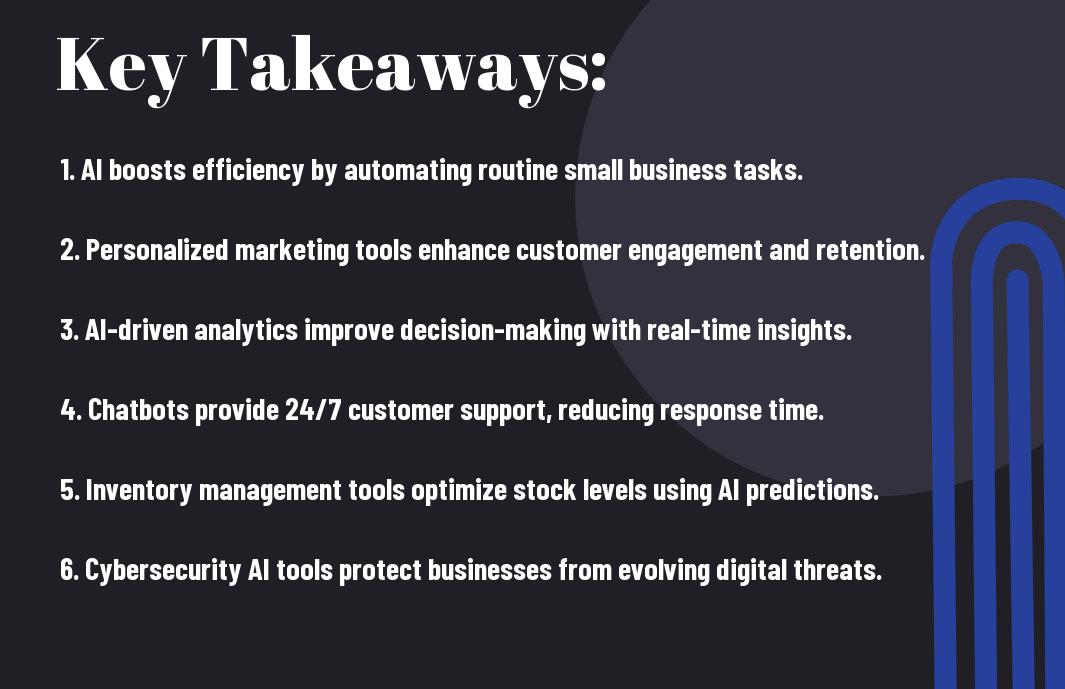Many small business owners are recognizing the transformative power of AI technologies to streamline operations and enhance customer experiences. In 2025, embracing cutting-edge tools can set you apart from the competition and foster significant growth. This post will guide you through five game-changing AI tools that you need to leverage in order to optimize your business process and increase your efficiency. By integrating these technologies into your daily operations, you’ll be better equipped to tackle the challenges of the modern marketplace.
Key Takeaways:
- Embrace AI automation for operational efficiency, which can streamline tasks like customer service and inventory management, freeing up resources for strategic growth.
- Utilize data analytics tools to gain deeper insights into customer behavior and preferences, enabling businesses to tailor offerings and improve marketing effectiveness.
- Invest in AI-driven marketing solutions to personalize customer engagement and enhance lead generation, driving more effective outreach and conversion strategies.

Understanding AI and Its Impact on Small Businesses
To thrive in today’s competitive landscape, it’s crucial for you to understand the role of artificial intelligence (AI) in transforming small businesses. AI technologies enable you to streamline operations, improve customer engagement, and make data-driven decisions, ultimately leading to increased efficiency and profitability. As the business environment evolves, leveraging AI will become fundamental to your success.
The Evolution of AI Technologies
Before being a buzzword, AI technologies have evolved significantly over the years, transitioning from basic automation to sophisticated systems capable of learning and adapting. This evolution has enabled small businesses like yours to access advanced tools previously reserved for larger enterprises, leveling the playing field and fostering innovation.
Importance of AI for Competitive Advantage
Behind your competitors, those businesses that harness AI gain a distinct edge in market dynamics, enabling them to understand customer preferences and optimize their offerings. You can expect AI to drive not only operational efficiency but also innovation in product development and customer service.
But the importance of AI extends beyond merely keeping pace with the competition; it’s about revolutionizing how you operate. Implementing AI tools allows you to access and analyze vast amounts of data for better decision-making, tailor marketing strategies to specific audiences, and enhance customer interactions with personalized experiences. By leveraging AI, you can stay ahead of market trends, adapt quickly to changes, and ultimately cultivate a more resilient business structure, ensuring your growth and success in an ever-evolving environment.
Tool 1: AI-Powered Customer Relationship Management (CRM)
If you’re looking to optimize your customer interactions in 2025, an AI-powered CRM is your go-to solution. This advanced tool will not only enhance your relationship management processes but also give you actionable insights into customer behavior, preferences, and interactions. By integrating AI capabilities, you’ll significantly improve response times and customer satisfaction, all while streamlining your workflows.
Features and Benefits
To harness the power of AI in your CRM, look for features like predictive analytics, automated customer support, and personalized marketing campaigns. These tools enable you to collect and analyze vast amounts of customer data, ensuring personalized interactions that enhance customer loyalty. With these benefits, you can expect improved sales forecasting, better resource allocation, and a more effective sales pipeline.
Case Studies of Successful Implementations
For small businesses considering an AI-powered CRM, numerous case studies showcase its effectiveness:
- Company A: Achieved a 30% increase in customer retention rates after implementing AI-driven personalized marketing campaigns.
- Company B: Increased sales conversion rates by 25% through predictive analytics that identified high-value leads.
- Company C: Reduced customer support response times by 40% using AI chatbots, improving overall customer satisfaction scores.
Relationship management through AI-enabled CRM has proven transformative for small businesses. These companies demonstrated that investing in this technology can yield significant returns. When tailored to customer needs, your CRM can help create a more engaging experience, ultimately boosting your bottom line. Consider these examples as a guide for your own AI journey.
Tool 2: Automated Marketing Solutions
For small businesses, automated marketing solutions represent a pivotal advancement in optimizing campaigns and maximizing efficiency. By leveraging AI-driven tools, you can streamline repetitive tasks such as social media scheduling, email campaigns, and lead nurturing, allowing you to focus on strategy and growth. These solutions not only save time but also enhance your customer engagement, ensuring your brand remains top-of-mind in a competitive landscape.
Enhancing Targeting and Personalization
To effectively reach your target audience, automated marketing solutions harness data analytics and machine learning algorithms. These technologies help you segment your audience and tailor personalized content that resonates with individual preferences. By delivering the right message at the right time, you can boost customer engagement, loyalty, and ultimately, conversion rates.
Measuring ROI and Effectiveness
On implementing automated marketing solutions, you’ll gain access to powerful analytics tools that track the performance of your campaigns. This enables you to measure your return on investment (ROI) accurately and assess the effectiveness of your marketing strategies.
Personalization is a game-changer in the world of marketing, and with automated solutions, you can dive deep into performance metrics. By analyzing data on customer behavior and engagement, you can identify what resonates most with your audience and adjust your strategies accordingly. This direct insight into customer interactions allows you to pivot swiftly, ensuring your marketing efforts yield maximum effectiveness and profitability. Moreover, you can identify underperforming campaigns and reallocate resources to areas that drive results, altogether enhancing your overall marketing performance.
Tool 3: Intelligent Financial Management Tools
After integrating intelligent financial management tools, you can transform the way your small business approaches accounting and financial tasks. These advanced solutions not only automate repetitive processes but also provide you with insights that can significantly impact your bottom line. In 2025, leveraging these tools will be vital to ensure your financial health and optimize your operations.
Streamlining Accounting Processes
About time-consuming tasks like invoicing and expense tracking, intelligent financial management tools can help you streamline your accounting processes. By automating these tasks, you free up valuable time, allowing you to focus on what you truly care about—growing your business. You’ll also reduce the risk of human errors, which can lead to financial discrepancies.
Insights Through Data Analytics
About gaining a clear understanding of your financial landscape, intelligent financial management tools offer valuable insights through data analytics. These platforms can analyze your spending patterns, sales trends, and overall cash flow, enabling you to make informed financial decisions. With these insights, you can proactively manage your business’s financial performance.
Also, by utilizing these data analytics features, you can visualize critical financial metrics and identify growth opportunities. With real-time analysis, you can spot inefficiencies that might be affecting your profits and adjust your strategies accordingly. Furthermore, these tools can alert you to possible financial risks before they escalate, ensuring you stay ahead of potential challenges. Ultimately, they empower you to make data-driven decisions that enhance your business performance.
Tool 4: Virtual Assistance for Operational Efficiency
Despite the challenges faced by small businesses, virtual assistants provide an effective solution to streamline operations. By leveraging AI-driven tools, you can automate routine tasks, enhance productivity, and free up valuable time for more strategic activities. This functionality is vital for maintaining competitiveness in the rapidly-evolving business landscape of 2025.
Task Automation and Scheduling
Across various sectors, task automation can significantly reduce the time spent on repetitive activities. With the help of AI technologies, you can schedule appointments, send reminders, and manage your calendar effectively, allowing you to dedicate more energy to growing your business.
Enhancing Communication and Collaboration
Against the backdrop of an increasingly digital workplace, facilitating seamless communication and collaboration is crucial for your team’s success. Utilizing virtual assistants allows you to integrate various communication platforms, ensuring that messages, updates, and project statuses are instantly shared and available.
Consequently, by adopting virtual assistants for communication and collaboration, you will notice improved team synergy and enhanced response time to client inquiries. These tools can centralize threads from different channels, reducing the odds of miscommunication and enhancing overall productivity. Incorporating AI into your communication strategies ensures you create a more cohesive work environment while meeting the expectations of your clients efficiently.

Tool 5: Data-Driven Business Intelligence Solutions
Many small businesses are increasingly turning to data-driven business intelligence solutions to gain a competitive edge by leveraging insights derived from their data. These tools help you analyze trends, identify customer behavior, and optimize operations more effectively, enabling informed decision-making that supports your growth objectives. By harnessing the power of AI and advanced analytics, you can transform raw data into strategic assets that drive your business forward in 2025.
Transforming Data into Actionable Insights
Across various sectors, businesses are experiencing transformations by utilizing data-driven business intelligence solutions. These tools can aggregate, analyze, and visualize data, allowing you to uncover patterns and trends that were previously hidden. This empowers you to make data-backed decisions that not only enhance your operational efficiency but also enhance customer satisfaction and overall performance.
Real-World Applications and Success Stories
Business intelligence solutions have been a game-changer for many organizations. Companies leveraging these tools have reported improved decision-making processes and significant increases in profitability. For instance, a small retail business utilized AI-driven analytics to optimize its inventory management, leading to a 20% reduction in waste and a 15% increase in sales over six months. Such compelling results exemplify how you can harness data to refine your business strategies and achieve impressive outcomes.
Plus, companies in diverse industries have seen remarkable transformations by applying business intelligence solutions. Take, for instance, a small marketing agency that utilized data analytics to fine-tune its advertising strategies, resulting in a 30% boost in customer engagement and a 25% increase in client retention rates. These examples demonstrate the tangible benefits of turning data into actionable insights, showing you that by embracing data-driven solutions, your organization can unlock its true potential and sustainably thrive in a competitive landscape.

Summing up
The AI Advantage – 5 Game-Changing Tools Every Small Business Needs in 2025 will empower you to stay competitive in an evolving marketplace. By leveraging AI tools tailored to your business needs, you can enhance efficiency, streamline operations, and improve customer experiences. As you explore these innovative solutions, consider how they can transform your business model and drive growth. For additional insights on this topic, check out AI Tools Changing Small Businesses in 2025 to stay ahead of the curve.
FAQ
Q: What are the five AI tools highlighted in ‘The AI Advantage – 5 Game-Changing Tools Every Small Business Needs in 2025’?
A: The five tools covered in the book include AI-powered customer service chatbots, predictive analytics platforms, automated marketing solutions, intelligent project management software, and AI-driven financial management tools. Each of these tools is designed to streamline operations, enhance customer engagement, and improve overall efficiency in small businesses.
Q: How can small businesses benefit from implementing AI tools?
A: Small businesses can experience numerous advantages by integrating AI tools into their operations. These benefits include improved customer experience through personalized interactions, advanced data analytics for informed decision-making, cost savings through automation, and enhanced productivity by freeing up time for employees to focus on strategic tasks. Additionally, leveraging AI can provide a competitive edge in the marketplace.
Q: What should small business owners consider before adopting AI technologies?
A: Before implementing AI technologies, small business owners should evaluate their specific needs and objectives. It’s important to assess whether the chosen AI tools align with their business goals and if they have the necessary infrastructure to support these technologies. Additionally, training employees to work effectively with AI tools and understanding data privacy concerns are vital for successful implementation. Investing in AI should be viewed as a strategy for long-term growth rather than a quick fix.


